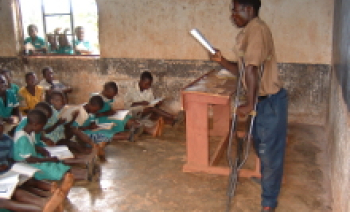The global campaign Young Voices, was launched by the charity Leonard Cheshire Disability (LCD) in 2006. Funded by the European Union, it has proven to be an innovative and efficient approach to providing a voice for people with Disabilities, one of the most marginalised groups within any society. Present in 21 countries, they campaign and advocate for the rights of all people with disabilities.
The movement was initiated when LCD supported the inclusion of young people with disabilities in the drafting of UN Convention on the Rights of Persons with Disabilities (UNCRPD). Thanks to the Young Voices movement, over 1200 people with disabilities have mobilised making their voices heard through various media with the aim of having the convention adopted by all governments, as over 50 countries have yet to ratify the treaty.
Despite making up 15% of the world’s population, and with an estimated 400 million people with disabilities living in extreme poverty, disability was not mentioned in any of the Millennium Development Goals (MDGs) targets. Disability and poverty are inextricably linked, and as a human rights issue, many believe that disability should be considered a component of development. The post-2015 agenda is seen as an opportunity for people with disabilities to ensure that “no one will be left behind” this time.
An interactive lab session, The Power of Young Voices with members of the LCD Young Voices network was held at the European Development Days (EDDs) 2013 to demonstrate the progress achieved, the different campaigns and initiatives taken, and to discuss how disability can become a crosscutting issue in the new development agenda.

Diane and David speaking on the panel at the EDDs
Diane Mallari from the Philippines and David Kabangu from Zambia were two of the panellists speaking in this session. They are both Young Voices campaigners and they shared their own country experiences. While coming from different continents and having different impairments, the challenges that they face are very similar, discrimination being the first barrier:
“In rural areas, the majority of people consider disability a curse and this leads to a person with a disability being rejected and mistreated by members of his/her family” said David who suffers from a hearing impairment.
Unjust and prejudicial treatment is just one of many challenges. David elaborated further, relating the complexity for him to communicate as people rarely learn sign language. These barriers have prevented him from exercising his right to education and employment. In fact, only 2% of children with disabilities have access to education in developing countries. Access to public transportation, health care and social services are among the other common barriers people with disabilities have to face.
The Young Voices initiative and the UN convention have provided the strength for more than 1200 young members to speak out, gather and campaign for what they feel is the most important to their situation.
In 2012, David and his colleagues conducted a campaign on labour and organised a consultative workshop with the goal of increasing the number of people with disabilities obtaining formal employment. Through discussion with key stakeholders, including the Deputy Minister of Labour, and large media coverage, resolutions were made leading to direct results as companies in Zambia started to employ people with disabilities.
Diane, who had bone cancer and subsequently had her leg amputated, campaigned through a different medium: music advocacy. She joined a group called Musikability, (the name stems from a combination of Music and ability), and together they raised awareness through the radio, social media, and even submitted an entry to a national song writing competition:
“It takes a lot of courage, hope and positivity to live just like a person without disability, most especially if you are in a developing country .Through our music, we hope to make the public aware that disabled people have the same interests and talent as everyone else.” Says Diane.
The UN convention recognises that disability is not a problem related to an individual’s impairment, but one that results from a complex interplay between the individual and the environment in which he/she lives.
Mahesh Chandrasekar is LCD’s International Policy and Campaigns Manager. Also a speaker on the panel at the EDDs, he insists that disability must be mainstreamed across different development issues, and simultaneously people with disabilities must be present at discussion tables, together with partners and policy makers:
“The goals of ending extreme poverty and sustainable development cannot be achieved by ignoring persons with disabilities.”
In order to leave no one behind in the post-2015 development agenda, and as has been repeated time and time again by many young and passionate speakers, people with disabilities have to be active participants in setting up and delivering the next development goals with the motto “Nothing About Us, Without Us”.
Watch an interview with Diane filmed at the EDDs
For more information on disability and development please visit the capacity4dev.eu group Disability and Development Network.
This collaborative piece was drafted by Héloïse Texier with input from Mahesh Chandrasekar and with support from the capacity4dev.eu Coordination Team. Priscilla Ngosa provided assistance with the sign language interpretation.




Log in with your EU Login account to post or comment on the platform.